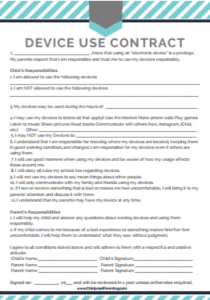What would happen if your family committed to just one week of going screen-free? Would you or your child experience panic, anxiety, unease, resentment?
Most parents and teens spend about nine hours a day in front of screens and agree that limiting their screen time to just school or work would be a major challenge. Eighty-three percent of the nine hours in front of screens typically has nothing to do with work or school and is spent texting, listening to music, watching shows and movies, playing video games, browsing websites, and using social media.
Why try a screen-free week?
A healthy diet of moderate screen time can be helpful and educational and contribute to better mental well-being, but there are many drawbacks to overconsumption. Over consuming can literally lead to addiction, poor sleep, and unhealthy weight gain.
Addiction
Playing video games can release dopamine, the “feel good” hormone that is part of the brain’s reward and pleasure circuits. There is an American Psychiatric Association diagnosis given to people who are addicted to online gaming: impulse control disorder. The negative effects of this disorder can be both physical and emotional. It is generally characterized by social isolation, feeling restless or irritable, preoccupied with previous or upcoming games, fatigue, poor personal hygiene, and migraines from eyestrain. While the short-term effects include isolation and poor self-care, the long-term effects can lead to financial, academic, and occupational consequences.
Sleep Deprivation
Sleep hygiene is essential for all humans, but it is especially critical to the developing teen brain. The use of screens in the evening has been correlated with the decreased number of hours of sleep teens get and can make the process of falling asleep more challenging. Screens have this effect is because most of them emit a blue light that interferes with the body’s natural ability to release melatonin, a hormone that causes one to feel sleepy at night. This delayed release tends to throw off the body’s natural biological clock and circadian rhythms.
Weight Gain
It is no surprise that weight gain is also associated with the use of screens. There are several contributing factors that can lead to unhealthy weight. The most obvious reason for weight gain is the lack of physical activity when sitting in front of a screen. The lack of sleep when screens are overused can also affect our body’s ability to regulate weight. And last, unhealthy foods are often marketed on screens, as well, which leads to poor food choices. Some screen-free advocates will go as far as to say that sitting is the new smoking.
Steps to Starting Healthy Screen Consumption
-
Identify screen-free time.
The goal is not to eliminate all use of screens but to set limits on it. It can be easiest to do this when there are clearly defined windows of time when screens are not available for use. For some families, mornings are a time when screen use is prohibited because most teens are rushing out the door to make it to school on time. There has also been research showing that screen use can have a negative effect on executive functioning (memory and attention). Not a great way to start the day! The dinner table and time in the car are also great opportunities to limit screen use. With the busy lives that teens lead these days, parents now have limited opportunities to connect with their children. These windows of time can be made sacred by setting hard limits on making them screen-free zones.
-
Get busy.
When kids are busy outdoors or engaged in extracurricular activities, they get the bonus of face-to-face communication. The American Academy of Pediatrics suggests that all kids get at least 60 minutes of activity a day. Explore their interests and get them signed up for weekly activities that reflect their interests.
-
Turn it off.
Set a deadline for when screens and technology get turned off. This can take the form of turning off a Wi-Fi router at a certain time each night or collecting phones, iPads, and computers to be charged in a place that is not visible. Your child’s health, development, and well-being are dependent on sleep. Encouraging healthy sleep habits sets your teen up for success in all aspects of their lives.
-
Be a role model.
Don’t think for a second that your child will alter their behavior if you aren’t making changes to the way you use screens. We cannot expect our children to regulate their screen use if we are not able to do so ourselves. Be mindful that the expectations you set for your child should be adhered to by everyone in the family.
-
Be a partner.
When approaching the subject of weaning your family from screens, make sure you take a collaborative approach. By developing these policies and rules together, you will have greater buy-in, and your teen will be more likely to adhere. When you are forming the policies, be clear that they apply to everyone in the family and that everyone is accountable. This approach often feels more respectful and collaborative, which will encourage your child to cooperate in the effort.
The use of screens and technology is inevitable in all of our lives. As parents, we need to be responsible users and help our teens to do the same. It takes some time and patience to make these changes, but they pay off by making parenting a whole lot easier, allowing more opportunities for connection with your child, and ensuring your child has the greatest opportunity to learn and grow.
Would you like to have your own Device Use Contract to make sure you are covering all your bases?
This article was originally written for The Committee For Children Blog.
About the Author: Melissa Benaroya
 Melissa Benaroya, LICSW, is a Seattle-based parent coach, speaker and author in the Seattle area (MelissaBenaroya.com). She created the Childproof Parenting online course and is the co-founder of GROW Parenting and Mommy Matters, and the co-author of The Childproof Parent. Melissa provides parents with the tools and support they need to raise healthy children and find more joy in parenting. Melissa offers parent coaching and classes and frequently speaks at area schools and businesses. Check out Melissa’s blog for more great tips on common parenting issues and Facebook for the latest news in parent education.
Melissa Benaroya, LICSW, is a Seattle-based parent coach, speaker and author in the Seattle area (MelissaBenaroya.com). She created the Childproof Parenting online course and is the co-founder of GROW Parenting and Mommy Matters, and the co-author of The Childproof Parent. Melissa provides parents with the tools and support they need to raise healthy children and find more joy in parenting. Melissa offers parent coaching and classes and frequently speaks at area schools and businesses. Check out Melissa’s blog for more great tips on common parenting issues and Facebook for the latest news in parent education.




Leave a Reply